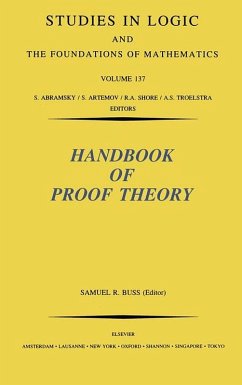This volume contains articles covering a broad spectrum of proof theory, with an emphasis on its mathematical aspects. The articles should not only be interesting to specialists of proof theory, but should also be accessible to a diverse audience, including logicians, mathematicians, computer scientists and philosophers. Many of the central topics of proof theory have been included in a self-contained expository of articles, covered in great detail and depth.
The chapters are arranged so that the two introductory articles come first; these are then followed by articles from core classical areas of proof theory; the handbook concludes with articles that deal with topics closely related to computer science.
The chapters are arranged so that the two introductory articles come first; these are then followed by articles from core classical areas of proof theory; the handbook concludes with articles that deal with topics closely related to computer science.
Dieser Download kann aus rechtlichen Gründen nur mit Rechnungsadresse in A, B, BG, CY, CZ, D, DK, EW, E, FIN, F, GR, HR, H, IRL, I, LT, L, LR, M, NL, PL, P, R, S, SLO, SK ausgeliefert werden.
Toshiyasu Arai
"The Handbook is most welcome in the logic community. I recommend the Handbook to researchers and graduate students in logic, mathematics, computer science, philosophy, linguistics, artificial intelligence, automated reasoning and cognitive sciences." --Bulletin of Symbolic Logic
"The Handbook is most welcome in the logic community. I recommend the Handbook to researchers and graduate students in logic, mathematics, computer science, philosophy, linguistics, artificial intelligence, automated reasoning and cognitive sciences." --Bulletin of Symbolic Logic


